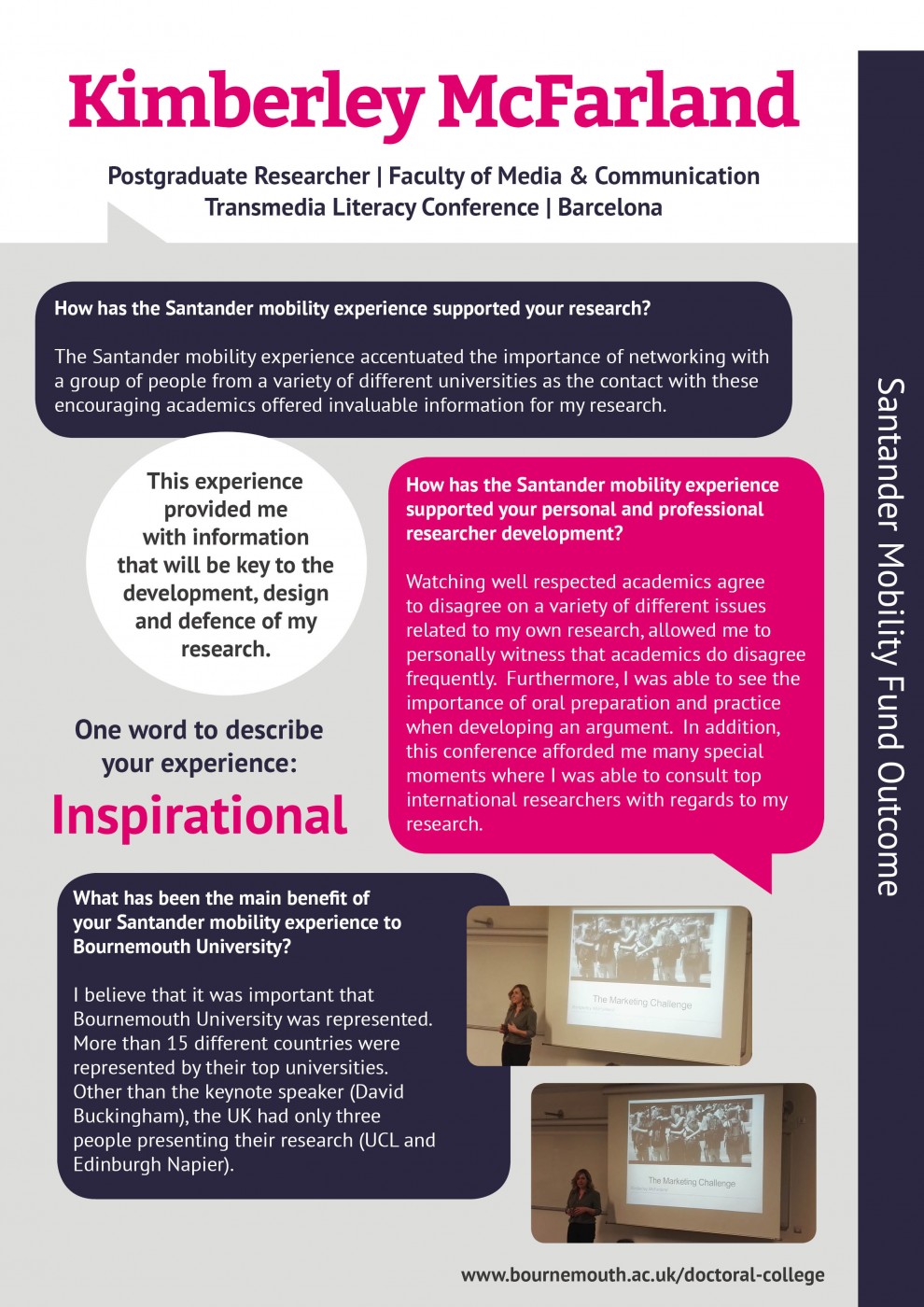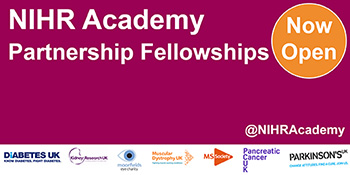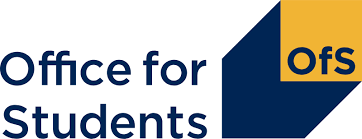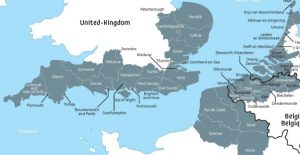
Doctoral College Santander Mobility Awards | Kimberley McFarland Awardee Report

Latest research and knowledge exchange news at Bournemouth University



As part of the new structure of NIHR Fellowships, the NIHR Academy is partnering with seven of the UK’s leading medical charities for the first time, to offer jointly funded Partnership Fellowships, at both Doctoral and Advanced (post-doctoral) level.
This jointly funded Partnership Fellowships will:
Please visit this link to find out more about this funding opportunity.

The OfS, through the first Challenge Competition, invites higher education providers to develop and implement projects to identify ways of supporting the transition to highly skilled employment and improving outcomes for graduates who seek employment in their home region.
Please see a summary of the awards below:
Deadline : 14 December 2018
Project start date : April 2019; completed by 31 March 2022 (three years)
Award available : Between £100,000 to £300,000 (individual); Up to £500,000 (collaborative bids with strategic partners)
Please see this link for more information about this funding opportunity.

The EPSRC Manufacturing the Future theme invites standard research proposals for consideration at a manufacturing-focused prioritisation panel. A standard Manufacturing panel will be held every quarter (subject to sufficient demand). Proposals for any panel should address key research challenges facing manufacturing in the UK today and in the future. This activity is intended to highlight the theme’s long term ambition to increase the number of investigator- led research ideas we support.
The Manufacturing the Future theme has prioritised funding to support investigator-led research ideas in manufacturing, with up to £3 million per panel available (dependent on demand and quality of proposals). Should there be insufficient demand we reserve the right for proposals to be considered at the most appropriate capability theme panel meeting.
The next batching dates are:
The batching dates are being published to help the manufacturing community plan and submit standard proposals. They are not deadlines but used by the Manufacturing the Future Theme to assess the level of demand in each quarter.
It is strongly recommended that proposals are submitted before the batching dates to ensure there is enough time for the peer-review process to be completed. Proposals submitted after this date, or those that do not have sufficient reviews in time for the panel, will be assessed by the most appropriate capability theme panel at a later date (i.e. Engineering, ICT, Physical Sciences or Mathematics).
Please see below a summary of this funding call :
Funding available : £3 million
Deadline : Open (However, it is suggested that applications be submitted in accordance with batching dates closing deadlines)
Please see this link for more information about this funding opportunity.

Reminder
Deadline for internal Expressions of Interest – 18th October 2018.
NERC introduced demand management measures in 2012. These were revised in 2015 to reduce the number and size of applications from research organisations for NERC’s discovery science standard grant scheme. Full details can be found in the BU policy document for NERC demand management measures at: http://intranetsp.bournemouth.ac.uk/policy/BU Policy for NERC Demand Management Measures.docx.
As at March 2015, BU has been capped at one application per standard grant round. The measures only apply to NERC standard grants (including new investigators). An application counts towards an organisation, where the organisation is applying as the grant holding organisation (of the lead or component grant). This will be the organisation of the Principal Investigator of the lead or component grant.
BU process
As a result, BU has introduced a process for determining which application will be submitted to each NERC Standard Grant round. This will take the form of an internal competition, which will include peer review. The next available standard grant round is January 2019. The deadline for internal Expressions of Interest (EoI) which will be used to determine which application will be submitted is 18th October 2018. The EoI form, BU policy for NERC Demand Management Measures and process for selecting an application can be found here: I:\R&KEO\Public\NERC Demand Management 2019.
NERC have advised that where a research organisation submits more applications to any round than allowed under the cap, NERC will office-reject any excess applications, based purely on the time of submission through the Je-S system (last submitted = first rejected). However, as RKEO submit applications through Je-S on behalf of applicants, RKEO will not submit any applications that do not have prior agreement from the internal competition.
Following the internal competition, the Principal Investigator will have access to support from RKEO, and will work closely with the Research Facilitator and Funding Development Officers to develop the application. Access to external bid writers will also be available.
Appeals process
If an EoI is not selected to be submitted as an application, the Principal Investigator can appeal to Professor Tim McIntyre-Bhatty, Deputy Vice-Chancellor. Any appeals must be submitted within ten working days of the original decision. All appeals will be considered within ten working days of receipt.
RKEO Contacts
Please contact Rachel Clarke, RKEO Research Facilitator – clarker@bournemouth.ac.uk or Jo Garrad, RKEO Funding Development Manager – jgarrad@bournemouth.ac.uk if you wish to submit an expression of interest.

 On Wednesday, 10th October 2018, BU staff had an opportunity to find out more about current EU funding opportunities. Delivered by BU institutional representative in Brussels, Andreas Kontogeorgos, presentations covered such topics as Brexit, forthcoming ICT calls, COST Actions and MSCA Innovative Training Networks.
On Wednesday, 10th October 2018, BU staff had an opportunity to find out more about current EU funding opportunities. Delivered by BU institutional representative in Brussels, Andreas Kontogeorgos, presentations covered such topics as Brexit, forthcoming ICT calls, COST Actions and MSCA Innovative Training Networks.
Presentations are now available on Brightspace. Please navigate to UKRO 2018 section to access all presentations.
If you have an interest in applying to Horizon 2020 and other European funding, please make full use of BU’s subscription by registering to receive updates from UKRO. On UKRO website, you can access subscriber-exclusive support materials including news, call fact-sheets and UKRO events.
 BU staff considering applying for any of these calls and other international funding, should contact international research facilitator Ainar Blaudums or other RKEO’s representatives at their faculties, for further information and support.
BU staff considering applying for any of these calls and other international funding, should contact international research facilitator Ainar Blaudums or other RKEO’s representatives at their faculties, for further information and support.
The National Institute for Health Research (NIHR) has announced up to £30 million of new funding to support research into mental health in low- and middle-income countries.
You can view the original article here which signposts links for more information.

Reminder
NERC introduced demand management measures in 2012. These were revised in 2015 to reduce the number and size of applications from research organisations for NERC’s discovery science standard grant scheme. Full details can be found in the BU policy document for NERC demand management measures at: http://intranetsp.bournemouth.ac.uk/policy/BU Policy for NERC Demand Management Measures.docx.
As at March 2015, BU has been capped at one application per standard grant round. The measures only apply to NERC standard grants (including new investigators). An application counts towards an organisation, where the organisation is applying as the grant holding organisation (of the lead or component grant). This will be the organisation of the Principal Investigator of the lead or component grant.
BU process
As a result, BU has introduced a process for determining which application will be submitted to each NERC Standard Grant round. This will take the form of an internal competition, which will include peer review. The next available standard grant round is January 2019. The deadline for internal Expressions of Interest (EoI) which will be used to determine which application will be submitted is 18th October 2018. The EoI form, BU policy for NERC Demand Management Measures and process for selecting an application can be found here: I:\R&KEO\Public\NERC Demand Management 2019.
NERC have advised that where a research organisation submits more applications to any round than allowed under the cap, NERC will office-reject any excess applications, based purely on the time of submission through the Je-S system (last submitted = first rejected). However, as RKEO submit applications through Je-S on behalf of applicants, RKEO will not submit any applications that do not have prior agreement from the internal competition.
Following the internal competition, the Principal Investigator will have access to support from RKEO, and will work closely with the Research Facilitator and Funding Development Officers to develop the application. Access to external bid writers will also be available.
Appeals process
If an EoI is not selected to be submitted as an application, the Principal Investigator can appeal to Professor Tim McIntyre-Bhatty, Deputy Vice-Chancellor. Any appeals must be submitted within ten working days of the original decision. All appeals will be considered within ten working days of receipt.
RKEO Contacts
Please contact Rachel Clarke, RKEO Research Facilitator – clarker@bournemouth.ac.uk or Jo Garrad, RKEO Funding Development Manager – jgarrad@bournemouth.ac.uk if you wish to submit an expression of interest.


The 7th Call for step 1 applications to the Interreg 2Seas programme is open.
If BU academics are interested or are not sure about participation, there is an introductory and project development workshop scheduled in London on 23rd October.
Here is the link to programme and registration; please be aware that registration closes on 16th October.
 Some projects are looking for UK Partners in following areas:
Some projects are looking for UK Partners in following areas:
– Recovery of phosphorous from waste water to re-use as fertiliser – looking for very particular types of organisation
– Re-using industrial waste as new products of value
– Circular entrepreneurship in the leisure economy
– Adapting to future risks from coastal storms and compound flood events
– Converting empty buildings into affordable housing.
If you are interested in joining any of above projects, please contact international Research Facilitator or your Funding Development Officer for more details.
More information on the programme available on Interreg 2Seas website.

The Conference ended with the PM’s speech, in which she declared the end of austerity and tried to fight back on Brexit. This came after a predictably colourful speech from Boris Johnson calling for the party to be more positive – and #chuckchequers. Neither talked about HE.
Education was on the agenda at the conference, though. Damien Hinds gave a speech mainly focusing on schools. He listed three key imperatives (all Ps):
And to deal with these challenges, he said that the plan was to focus on:
He also talked about character, workplace skills and extra-curricular activities.
Level 4 and 5 qualifications have been discussed a lot recently – see the August report by Professor Dave Phoenix, VC of South Bank University has written for HEPI “Filling in the biggest skills gap: Increasing learning at Levels 4 and 5”.
The DfE are conducting a review of classroom-based, level 4 & 5 technical education launched in October 2017 (interim findings here) which will inform the ongoing Review of Post-18 Education.
A new £8 million funding competition will enable virtual, augmented and mixed reality experiences – also known as immersive content – to be created faster and more efficiently by UK content creators. The competition is part of the Industrial Strategy Challenge Fund’s audience of the future programme. Up to £33 million is available to develop new products and services that exploit immersive technologies. Funding is provided by UK Research and Innovation through Innovate UK.
Also while the Conservative Party Conference was going on, announcements were made about future immigration rules post Brexit.
From Dods: a White Paper outlining how the system will work to be published in the autumn, ahead of legislation next year. The proposals largely mirror the recommendations of the Migration Advisory Committee from September, and offer no preferential treatment for EEA citizens coming to the country. Notably, there is a commitment under the new system not to cap the number of student visas. (there is currently no such cap)
Under the proposals:
Theresa May said:
And meanwhile, at the conference, the Home Secretary announced a new “British values” test for those applying for UK citizenship, which will be “significantly tougher” than the current test, which he said was like a pub quiz, and would be accompanied by strengthened English language tests.
The Office for Students (OfS) has published new analysis of degree apprenticeships.
30 per cent of degree apprenticeship entrants come from areas underrepresented in higher education, slightly higher than the proportion entering similar full-time higher education courses (26 per cent).
The Office for Students (OfS), has launched its first Challenge Competition, inviting providers to develop and implement projects to identify ways of supporting the transition to highly skilled employment and improving outcomes for graduates who seek employment in their home region.
The OfS intends to support a range of projects that will deliver innovative approaches for graduates and particular student groups, to contribute to improved outcomes and local prosperity. Through this process we want to identify:
Providers with successful bids will be expected to form a network to share, discuss and disseminate key information among themselves and with the OfS, strategic partners, and the wider sector as required.
From Wonkhe: ONS has released its annual estimates of the value of the UK’s “human capital” – and if you like to promote higher education on the basis of pay premia, it’s not great news for the sector. The headline news is that back in 2004 the average premium for “first and other degrees” was 41%, but by 2017, it had reduced to 24%. The same has happened for “masters and doctorates” – where the pay premia has declined from 69% in 2004 to 48% in 2017. Although the premia for graduates is still significant, the downward trend will provide ammo to those who argue that “too many people are going to university”, ONS says that “one explanation for this could be a large increase in the proportion of the population with a university degree”.
On Wonhke, David Kernohan wrote on 30th September about learning gain “Plenty ventured, but what was gained?”.
The learning gain projects were expected to lead to discussions about a new TEF metric for learning gain – or at least to a set of tools and methodologies that providers would over time start to adopt to support their TEF submissions –because learning gain is an important element of the TEF, but one that it is not currently reflected in the metrics.
And so on 2nd October, Yvonne Hawkins of the OfS responded, also on Wonkhe:
So what are the next steps as set out by the OfS? They are “committed to developing a proxy measure for learning gain”. And it “will form part of a set of seven key performance measures to help us demonstrate progress against our student experience objective”. And how will they get there? There will be evaluations of the projects that did go ahead, and then there will be a conference, and recommendations to the OfS board in March 2019 about the next phase of work.
So watch this space….
Another week another article on free speech by the Minister– this time on Research Professional to coincide with the Conservative Party Conference.
To subscribe to the weekly policy update simply email policy@bournemouth.ac.uk
JANE FORSTER | SARAH CARTER
Policy Advisor Policy & Public Affairs Officer
66724 65070
Follow: @PolicyBU on Twitter | policy@bournemouth.ac.uk
NERC introduced demand management measures in 2012. These were revised in 2015 to reduce the number and size of applications from research organisations for NERC’s discovery science standard grant scheme. Full details can be found in the BU policy document for NERC demand management measures at: http://intranetsp.bournemouth.ac.uk/policy/BU Policy for NERC Demand Management Measures.docx.
As at March 2015, BU has been capped at one application per standard grant round. The measures only apply to NERC standard grants (including new investigators). An application counts towards an organisation, where the organisation is applying as the grant holding organisation (of the lead or component grant). This will be the organisation of the Principal Investigator of the lead or component grant.
BU process
As a result, BU has introduced a process for determining which application will be submitted to each NERC Standard Grant round. This will take the form of an internal competition, which will include peer review. The next available standard grant round is January 2019. The deadline for internal Expressions of Interest (EoI) which will be used to determine which application will be submitted is 18th October 2018. The EoI form, BU policy for NERC Demand Management Measures and process for selecting an application can be found here: I:\R&KEO\Public\NERC Demand Management 2019.
NERC have advised that where a research organisation submits more applications to any round than allowed under the cap, NERC will office-reject any excess applications, based purely on the time of submission through the Je-S system (last submitted = first rejected). However, as RKEO submit applications through Je-S on behalf of applicants, RKEO will not submit any applications that do not have prior agreement from the internal competition.
Following the internal competition, the Principal Investigator will have access to support from RKEO, and will work closely with the Research Facilitator and Funding Development Officers to develop the application. Access to external bid writers will also be available.
Appeals process
If an EoI is not selected to be submitted as an application, the Principal Investigator can appeal to Professor Tim McIntyre-Bhatty, Deputy Vice-Chancellor. Any appeals must be submitted within ten working days of the original decision. All appeals will be considered within ten working days of receipt.
RKEO Contacts
Please contact Rachel Clarke, RKEO Research Facilitator – clarker@bournemouth.ac.uk or Jo Garrad, RKEO Funding Development Manager – jgarrad@bournemouth.ac.uk if you wish to submit an expression of interest.

 As previously announced, RKEO will host seminar on EU funding opportunities (FG06, Talbot Campus, Fusion Building) on 10th October 2018. Sessions will be delivered by European Advisor of the UK Research Office Dr Andreas Kontogeorgos.
As previously announced, RKEO will host seminar on EU funding opportunities (FG06, Talbot Campus, Fusion Building) on 10th October 2018. Sessions will be delivered by European Advisor of the UK Research Office Dr Andreas Kontogeorgos.
Please register to allow us to order lunch and refreshments for all attendees this week.
Sessions will commence at 11:30 with an update on Brexit, followed by a networking lunch. In the afternoon there will be a review of future ICT-related calls and more detailed overview of the COST Actions and Marie Curie training networks (MSCA ITN) funding schemes.
Everybody is welcome to choose to attend any of the sessions below:
 11:30 – 12:00 – Brexit News, Q&A (to be continued during lunch if necessary)
11:30 – 12:00 – Brexit News, Q&A (to be continued during lunch if necessary)
12:00 – 13:00 – Networking Lunch
13:00 – 14:15 – Cross-disciplinary nature of ICT – forthcoming Horizon 2020 calls and topics under pillars of Industrial Leadership and Societal Challenges
14:15 – 14:30 – Comfort break / over-run time / time for people to come and in and out
14:30 – 15:15 – COST Actions – bottom-up driven networks for expanding European Cooperation in Science and Technology
15:15 – 16:30 – Overview of MSCA ITN funding scheme, followed by Q&A session
P.S. If you were unable to register, (quiet) drop-in to any separate session will be accepted.
 The call for the next round of BA/Leverhulme Small Research Grants will open 5th October 2018 and close 5pm on Wednesday 7th November 2018 and is aimed at Early Career Researcher and/or pump priming purposes.
The call for the next round of BA/Leverhulme Small Research Grants will open 5th October 2018 and close 5pm on Wednesday 7th November 2018 and is aimed at Early Career Researcher and/or pump priming purposes.
It is strongly advised that you attend the British Academy small guidance session on 9th October 2018, where the Funding Development team will go through:
After the session you will have the chance to sit with a Research Facilitator and Funding Development Officer, to go through costs and your draft proposal. As well as the opportunity to have your proposal reviewed by an external application reviewer.
If you can’t attend this session, then we ask you to submit your intention to bid form to your Funding Development Officer by 9th October 2018, after this date applications will be moved to the summer round.
The British Academy have provided updated guidance on the small grants – BA scheme notes for applicants and BA FAQs . They have asked that all applicants read the documentation carefully before starting their application.
Timeline
The call closes at 5pm on Wednesday 7th November 2018.
| Date | Action |
| 5 October 2018 | Scheme Opens |
| 9th October | RKEO British Academy Guidance session and/or
Intention to bid forms to be submitted to your faculty funding development officer |
| 4th November midnight | Nominated referee supporting statement to be completed via FlexiGrant |
| 4th November midnight | Your final application must be submitted on FlexiGrant by this date at the latest |
| 5th – 7th November 2018 | Institutional checks to take place by RKEO |
| 7th November 2018 | Submission |
Any queries please contact Alexandra Pekalski